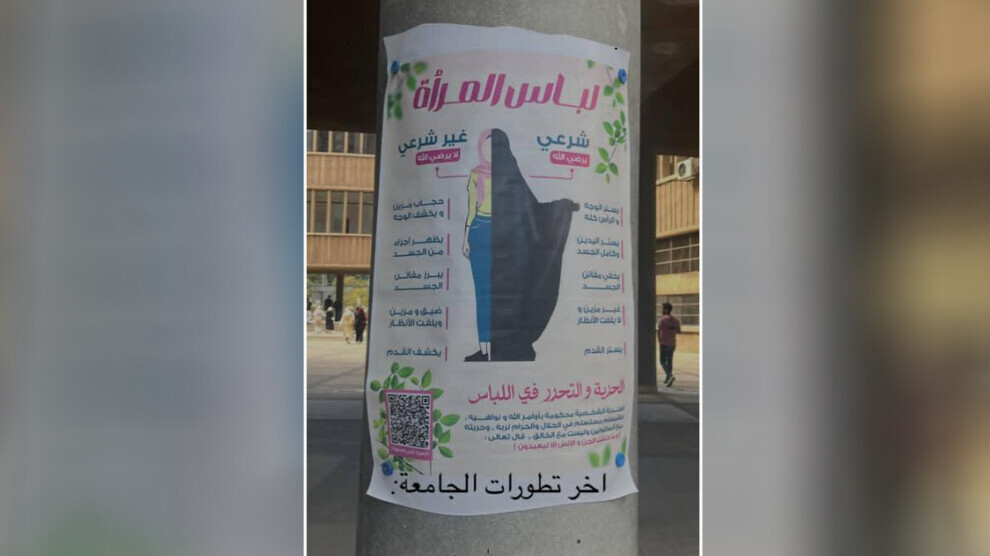Posters at the University of Aleppo Promote the “Sharia Dress”
In recent days, the University of Aleppo has witnessed a campaign featuring wall posters illustrating what is described as the “Sharia-compliant and non-compliant women’s dress.” The campaign sparked widespread controversy on social media.

Sirin Mohammed
Aleppo — After jihadists from Hay’at Tahrir al-Sham took control in Syria, they began imposing their strict Islamic ideology. In recent days, individuals have been posting “stickers” across the University of Aleppo showing what they call the “proper Islamic dress” and the “improper one,” igniting debate over the motives and message behind such acts.
The published image shows a veiled woman completely covered in black clothing that hides all her features, labeled as “Sharia-compliant.” On the opposite side, an image of a veiled woman is described as “non-compliant and displeasing to God.”
The posters include phrases pointing out the supposed flaws in the “improper hijab”: “A decorated hijab that reveals the face, exposes parts of the body, highlights body shape, is tight or adorned and draws attention, reveals the feet.”
In contrast, the “proper hijab,” according to the poster, “covers the face and entire head, the hands and the whole body, hides body shape, is plain and does not attract attention, and covers the feet.”
It concludes with a Qur’anic verse: “And I did not create the jinn and mankind except to worship Me.”
The posters appeared in several areas of the University of Aleppo — near the Faculty of Electrical Engineering, Civil Engineering, Medicine, the central library, and the Faculty of Agricultural Engineering. It is noteworthy that the “General Secretariat for Political Affairs” at the University of Aleppo prohibits posting any materials without its approval, which suggests that the administration was aware of and approved the dissemination of these radical religious messages.
“The extremist propaganda of the Interim Government contradicts the ideals of free women”
Commenting on the issue, Reyhan Allo, a member of the Star Congress Coordination in Aleppo, condemned these practices against women, which aim to suppress their freedom and confine them within the limits of their black garments. She stated:
“These posters published in the University of Aleppo restrict women’s freedom and agency. They call for women to hide their faces, hands, and even their voices.”
She added that such ideas do not stem from moderate Islam but from extremist and radical interpretations. The Interim Government shows no acceptance of women’s roles in society.
“We, the women of Aleppo, have always followed the path and philosophy of Women, Life, Freedom. Within our self-administration, women have key roles in all areas — political, economic, and even military. Women’s participation is essential in building a new, democratic homeland.”
All these extremist campaigns and propaganda oppose the concept of a free and humane woman. There is no verse in the Qur’an that commands women to cover their faces in the manner promoted by extremists.
It is also worth noting that the Interim Government has imposed restrictions forbidding a man from accompanying a woman who is not a close relative (“mahram”). The General Security stops any man and woman walking together, demands their identification, and if no family relation is proven, they are detained.
Additionally, after the fall of the Baath regime, groups of women around the Aleppo Citadel, Saadallah al-Jabiri Square, and the public park began handing out “abayas and niqabs” to unveiled women, urging them to wear them so as “not to anger God,” as they claimed
